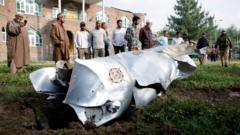The recent massacre of civilians in Kashmir has reignited fierce discord between India and Pakistan, marking one of the most severe confrontations in years.
Escalating Tensions: Terrorist Strike ignites new Conflict between India and Pakistan

Escalating Tensions: Terrorist Strike ignites new Conflict between India and Pakistan
Recent attacks have intensified longstanding hostilities, challenging regional stability and safety.
In April, a brutal terrorist attack left 26 individuals dead, many of them identified by their Hindu faith, disrupting a façade of peace maintained by the Indian government. The assailants emerged unexpectedly from wooded areas at a popular picnic location, resulting in horrifying casualties witnessed by families.
A relatively obscure group called the Resistance Front claimed responsibility for the attack. The Indian government has attributed this act to a larger network of terrorist organizations believed to operate from within Pakistan’s borders. In response, India has enacted military strikes aimed at these groups, igniting an ongoing military conflict, a claim promptly denied by Pakistan officials.
Key groups identified by India include Lashkar-e-Taiba, known for its historical ties to significant violent attacks in the country, as well as Jaish-e-Muhammad, both of which are allegedly underpinned by broader operational structures rooted in Pakistan.
Lashkar-e-Taiba, which has long been implicated in high-profile attacks including the horrific 2008 Mumbai attacks that claimed over 160 lives, was placed on the UN sanctions list back in 2005. Despite being labeled as outlawed, the group’s founder, Hafiz Saeed, remains at large and Indian authorities assert that the organization continues to function through various affiliates like the Resistance Front, further complicating efforts toward diplomatic resolution.
As political leaders navigate the thorny aftermath of these events, the region faces an uncertain path ahead, with increasing calls for accountability and a potential pathway to lasting peace remaining critically urgent.
A relatively obscure group called the Resistance Front claimed responsibility for the attack. The Indian government has attributed this act to a larger network of terrorist organizations believed to operate from within Pakistan’s borders. In response, India has enacted military strikes aimed at these groups, igniting an ongoing military conflict, a claim promptly denied by Pakistan officials.
Key groups identified by India include Lashkar-e-Taiba, known for its historical ties to significant violent attacks in the country, as well as Jaish-e-Muhammad, both of which are allegedly underpinned by broader operational structures rooted in Pakistan.
Lashkar-e-Taiba, which has long been implicated in high-profile attacks including the horrific 2008 Mumbai attacks that claimed over 160 lives, was placed on the UN sanctions list back in 2005. Despite being labeled as outlawed, the group’s founder, Hafiz Saeed, remains at large and Indian authorities assert that the organization continues to function through various affiliates like the Resistance Front, further complicating efforts toward diplomatic resolution.
As political leaders navigate the thorny aftermath of these events, the region faces an uncertain path ahead, with increasing calls for accountability and a potential pathway to lasting peace remaining critically urgent.



















